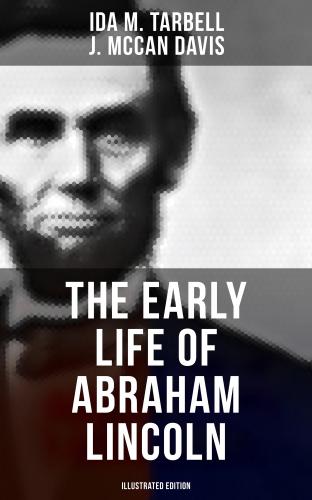Ida M. Tarbell, J. McCan Davis
The Early Life of Abraham Lincoln
(Illustrated Edition)
Published by
Books
- Advanced Digital Solutions & High-Quality eBook Formatting -
2018 OK Publishing
ISBN 978-80-272-4779-0
Table of Contents
I. Memoranda for Lincoln’s Genealogy.
II. Christopher Columbus Graham and His Reminiscences of Lincoln’s Parents.
III. A Leaf from Lincoln’s Exercise-Book, Used in 1824.
IV. The Oldroyd Lincoln Collection.
THE EARLIEST PORTRAIT OF ABRAHAM LINCOLN.—HITHERTO UNPUBLISHED.
From a carbon enlargement, by Sherman and McHugh, New York, of a daguerreotype in the possession of the Hon. Robert T. Lincoln, and first published in the McClure’s Life of Lincoln. It is generally believed that Lincoln was not over thirty-five years old when this daguerreotype was taken, and it is certainly true that it shows the face of Lincoln as a young man. It is probably earlier by six or seven years, at least, than any other existing portrait of Lincoln.
Introduction
It has been only within the last ten years that the descent of Abraham Lincoln from the Lincolns of Hingham, Massachusetts, has been established with any degree of certainty. The satisfactory proof of his lineage is a matter of great importance. In a way it explains Lincoln. It shows that he came of a family endowed with the spirit of adventure, of daring, of patriotism, and of thrift; that his ancestors were men who for nearly two hundred years before he was born were active and well-to-do citizens of Massachusetts, New Jersey, Pennsylvania, or Virginia, men who everywhere played their parts well. Abraham Lincoln was but the flowering of generations of upright, honorable men.
The first we learn of the Lincolns in this country is between the years 1635 and 1645, when there came to the town of Hingham, Massachusetts, from the west of England, eight men of that name. Three of these, Samuel, Daniel, and Thomas, were brothers. Their relationship, if any, to the other Lincolns who came over from the same part of the country at about the same time is not clear. Two of these men, Daniel and Thomas, died without heirs; but Samuel left a large family, including four sons. Among the descendants of Samuel Lincoln’s sons were many good citizens and prominent public officers. One was a member of the Boston Tea Party, and served as a captain of artillery in the War of the Revolution. Others were privates in that war. Three served on the brig “Hazard” during the Revolution. Levi Lincoln, a great-great-grandson of Samuel, born in Hingham in 1749, and graduated from Harvard, was one of the minute-men at Cambridge immediately after the battle of Lexington, a delegate to the convention in Cambridge for framing a State Constitution, and in 1781 was elected to the Continental Congress, but declined to serve. He was a member of the House of Representatives and of the Senate of Massachusetts, and was appointed Attorney-General of the United States by Jefferson; for a few months preceding the arrival of Madison he was Secretary of State, and in 1807 he was elected Lieutenant-Governor of Massachusetts. In 1811 he was appointed Associate Justice of the United States Supreme Court by President Madison, an office which he declined. From the close of the Revolutionary War he was considered the head of the Massachusetts bar.
His eldest son, Levi Lincoln, born in 1782, had also an honorable public career. He was a Harvard graduate, became Governor of the State of Massachusetts, and held other important public offices. He received the degree of LL.D. in 1824 from Williams College, and from Harvard in 1826.
Another son of Levi Lincoln, Enoch Lincoln, served in Congress from 1818 to 1826. He became Governor of Maine in 1827, holding the position until his death in 1829. Enoch Lincoln was a writer of more than ordinary ability.
The fourth son of Samuel Lincoln was called Mordecai (President Lincoln descended from him, being his great-great-great-grandson). Mordecai Lincoln was a rich “blacksmith,” as an iron-worker was called in those days, and the proprietor of numerous iron-works, saw-mills, and grist-mills, which with a goodly amount of money he distributed at his death among his children and grandchildren. Two of his children, Mordecai and Abraham, did not remain in Massachusetts, but removed to New Jersey, and thence to Pennsylvania, where both became rich, and dying, left fine estates to their children. Their descendants in Pennsylvania have continued to this day to be well-to-do
